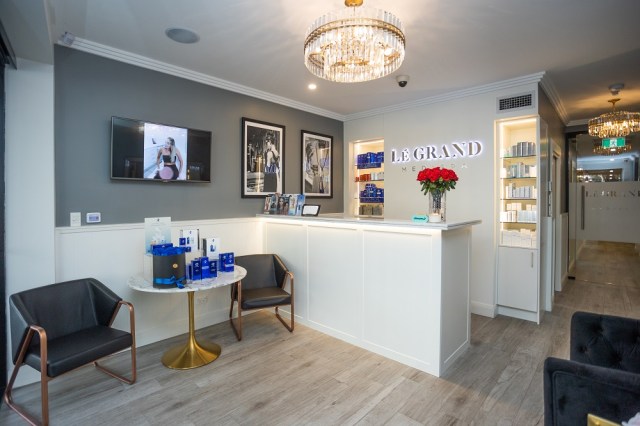Last week, I was told ‘no’ for a skin treatment.
And I’m so pleased I was.
Here’s why –
Last Tuesday, I dropped in to meet the team at Le Grand MediSpa in Sydney’s Concord. I entered the space’s quaint, stylish reception area to meet with the team. As a first step, I was given a questionnaire to fill out – an essential protocol before any treatment. From there, my elected skin therapist directed me to one of several treatment rooms for further consultation.
Through the years, I’ve become accustomed to this consultation process, where details around my skin health, medications and lifestyle are shared. As aestheticians, you’ll know how vital this consultation process is. The degree to which a client’s skin history is examined, however, can vary from business-to-business. For the team at Le Grand, the more time allocated to this phase of the appointment, the better the outcome for the client.
“It is our duty of care that we are up-to-date with all clients’ (new and/or existing) current medical health,” says Le Grand’s Director*. “This extends to any vitamin and supplement intake, and any changes to current skincare regimes. Any medical and aesthetic treatments that may or may not have been had in our clinic [are also considered].”

As a secondary measure, my skin therapist used the Observ 520 system to get a closer look at both my surface skin and lower dermal layers. I was shocked by the results, realising a visibly discreet patch of postpartum melasma on my forehead was far larger and darker underneath. Redness was also wide-spread, and while typical for clients to experience in Winter, was an indication worth noting nonetheless.
While the clinic’s initial questionnaire was telling, it was during the casual conversation I had with my skin therapist post-Observ analysis that a potential roadblock arose. On discussing my discolouration, I remembered to tell her that I’d undergone cosmelan five months prior – a uniquely intensive depigmenting treatment. Rather than undertake another exfoliating skin treatment as planned, I was immediately advised my skin was likely still in recovery mode.
“With modern day aesthetic treatments being performed in our clinic we need to be aware of anything that may be contraindicated to our services and that may prohibit us from performing a service on our clients,” Le Grand’s Director explains. Without this level of consultation, she agrees that conducting intensive treatment atop intensive treatment can contribute to the impairment of one’s skin barrier.
“When the skin’s barrier becomes damaged or impaired, it loses or becomes unable to hold onto the vital substances that keep skin cells intact: ceramides, cholesterol, and fatty acids like linoleic acid,” Le Grand’s Director tells me. “This leads to water loss and skin becoming more vulnerable to all external aggressors which can, in turn, exasperate the problem.”
A common impression within the aesthetics industry is that a compromised skin barrier is largely at the fault of the client, however Le Grand’s Director discredits this. “There are several causes of a compromised or damaged skin barrier, including intrinsic factors and extrinsic factors such as external influences, genetic predispositions, and age. External influences can be using incorrect skincare but that is only one factor. The skin barrier can continue to weaken with age [which] can be attributed to a loss of moisture within the skin cells and reduced hydration in the body over time.”
Had the Le Grand team not checked for contraindications and proceeded with our planned exfoliation treatment, therefore not allowing for adequate recovery time post-cosmelan, “we would have in fact aided in causing an ‘impaired skin barrier’” through over-processing the skin, Le Grand’s Director says.
As an additional precautionary measure, my skin therapist sought a second opinion from the team’s trainer with iS Clinical – the medical-grade cosmeceutical line used in a number of Le Grand’s skin treatments. “Building a strong relationship is valuable… we were able to get a prompt reply,” Le Grand’s Director says. “Our iS Clinical trainer views Le Grand MediSpa as a key account dedicated to their brand.” It’s through this line of communication, Le Grand’s Director believes, allows the team to provide a “first class customer service every time.”
“At Le Grand MediSpa, we are dedicated to the continued education of our team members. By sending our staff to regular training sessions and giving up valuable in-clinic treatment time to accommodate our suppliers so that they may make regular visits to train our team members has been our secret to success.”
Ultimately, the team was able to accommodate me with a soothing and hydrating Energy C treatment by mesoestetic, designed to counteract UV damage and to brighten the skin – it was heavenly!
“Educated staff means better treatment outcomes for clients, therefore client satisfaction and retention. It’s because of this approach towards education, that we are able to establish strong relationships with our suppliers,” Le Grand’s Director says. “Both parties are witness to one another’s dedication to delivering the best in customer service and care.”
*Name withheld for privacy.
Read the current issue of our digital magazine here:
- For more news and updates, subscribe to our weekly newsletter
- Follow us on Instagram
- Like us on Facebook
- Join Australia’s largest network of beauty industry professionals on LinkedIn
- Subscribe to our print magazine
Have an idea for a story or want to see a topic covered on our site and in our pages? Get in touch at info@professionalbeauty.com.au.

